Recap: NABJ’s Black Twitter Conference
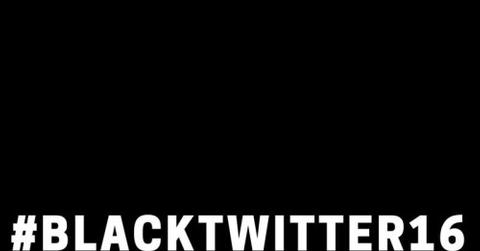
Columbia University Graduate School of Journalism and the National Association of Black Journalists Media Institute hosted the first ever NABJ Black Twitter Conference. The event featured influencers from and along with other major content creators.
The influencers who were panelists at the conference are contributors to the phenomenon that is known as Black Twitter – a space where people of color share stories and thoughts. Black Twitter is influential, yet it’s not an anomaly: there are journalists, scholars and normal every-day people who contribute to the space on Twitter.
With roughly 150 individuals in attendance including the creator of the #OscarsSoWhite hashtag, April Reign (@ReignOfApril), attendees were able to discuss the Oscars and how their lack of diversity year after year inspired her to create the hashtag which generated a conversation online which is still ongoing.
In addition to discussing what Black Twitter is and how it contributes to newsrooms in the U.S., the conference addressed how to utilize Black Twitter as a resource and tool. As a whole, the conference was extremely beneficial for avid users of Twitter and others who are seeking to learn why the platform is a great tool for marketing, branding and more.
An Introduction to Black Twitter
Moderator: Sarah Glover (@sarah4nabj), President,
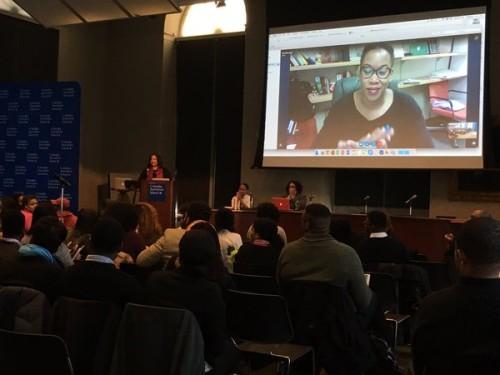
Panelists:
- Jamilah King (@JamilahKing), Senior Staff Writer, Mic
- Sherri Williams (@SherriWrites), Ph.D., Wake Forest University
- Meredith Clark (@MeredithClark), Ph.D., University of North Texas
During this portion, the panelists touched on the point that Black Twitter is where a lot of major online conversations begin before they go viral. Jamilah King of Mic shared that as a journalist she scans for stories on Twitter every morning. Sherri Williams, Ph.D. expressed how Black Twitter effects the television industry by live-tweeting shows like ABC’s highly popular, Scandal.
“There are a lot of stories in the newsroom that don’t come out. Social media shows those stories [without] vindicators and gatekeepers… Black Twitter [has shifted] it’s an entity that people take seriously,” shared panelist Sherri Williams, Ph.D.
Clark however, reminded us of the importance of not depending on a platform that we don’t have ownership in. “We can use Twitter as a tool but we can’t rely on it. We don’t own it… Twitter is not going to replace the black press,” said Meredith Clark, Ph.D.
Top Tools For Social Media Panel
Moderator: Sarah Glover (), President,
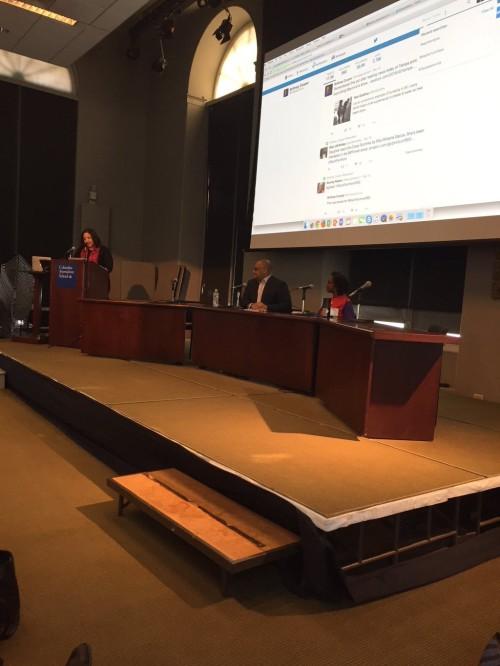
Panelists:
- Marcus Mabry (@MarcusMabry), Editor, Twitter Moments
- Brionna Jimerson (@BrionnaJay), Social Media Analyst, ABC News
During the Top Tools for Social Media panel both media curators shared how Twitter and social media plays a role in storytelling. Brionna Jimerson shared that she utilizes Adobe Omniture, CrowdTangle and Social Flow to analyze data at ABC News. As an editor and overseer of the content that is published on Twitter’s new section, Twitter Moments, Marcus Mabry shared what makes stories compelling and journalistic in quality.
“Twitter Moments elevates the most important stuff at the moment in a visual and stunning way. We spend 24/7 curating the stream,” said Mabry. He further explained that this new section on Twitter brings a sense of urgency to the platform and also shared that great moments are fun, engaging and touching.
Jimerson later shared that users of different social media platforms must “…approach social media as a product.” She also shared that looking at your own content as a product is essential.
Mabry also touched on the importance of being aware of ever-changing algorithms on social platforms. His tips related to reporting despite constant platform changes included: continue creating good content such as high-quality videos and photos.
#OscarsSoWhite Luncheon
Moderator: Patrick Riley (@PATARACK) in coversation with April Reign (@ReignOfApril), Broadway Black Managing Editor, Nu Tribe Magazine Editor-At-Large
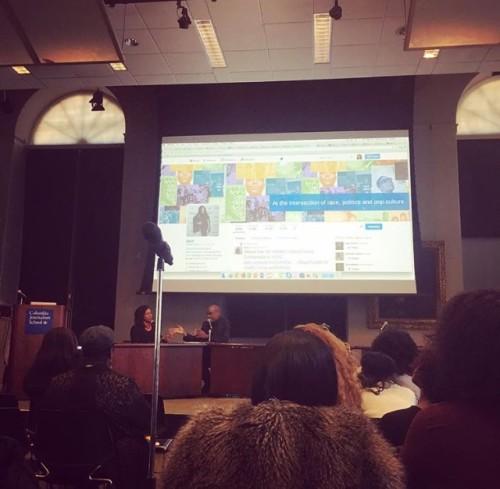
April Reign is the creator of the #OscarsSoWhite hashtag which shed light on the major issues that the film industry has with diversity and representation of people of color. The hashtag was created to address the “lack of representation of marginalized communities,” said Reign.
During the luncheon, Reign shared why Twitter is a resourceful platform, how she found Broadway Black on Twitter, and exactly why Twitter has the power to make systematic change in society by creating conversations offline.
“Black Twitter is incredibly powerful not only socially, but financially,” she said.
One of the most important ideals she broke down included the stories that surface on Black Twitter which is how many individuals share their Black experiences.
Reign highlighted the issue of newsrooms capitalizing off of the shared experiences and stories of Black Twitter users. “Journalists and media get stories from Black Twitter every day… I want journalists and media to not only be respectful but [to] also go to the source,” she said.
Reign boycotted the 88th Academy Awards because she believes that if the Oscars don’t represent people of color, then they don’t deserve high views amongst communities they aren’t representing. In closing, Reign shared that the Academy and gatekeepers in positions of power should put more pressure on Hollywood to be more diverse on-camera and behind the scenes. She also mentioned that more mentoring opportunities for writers and filmmakers of color should be created.
Black Twitter Making the Headlines – #BlackLivesMatter and Beyond
Moderator: Sarah Glover (@sarah4nabj), President of National Association of Black Journalists
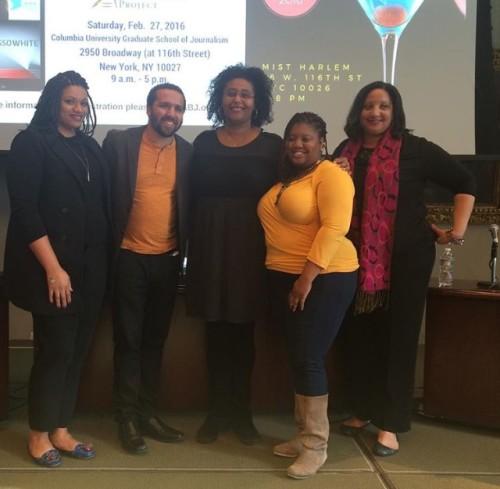
Panelists:
- Chelsea Fuller (@fulloffaith22), Senior Communications Associate, Advancement Project
- Wesley Lowery (@WesleyLowery), National Reporter, Washington Post
- Kimberly C. Ellis, Ph.D., Consultant, Fierce Star Media
- Nakisha Lewis, Senior Strategist, Safety, Ms. Foundation For Women
The panelists shared what Black Twitter means to them and expanded on how it has a place in social movements. They also expanded on how hashtag activism is real, how Twitter can be utilized as a major media tool and also how activism offline is highly important.
From the perspective of an activist according to Nakisha Lewis of Black Lives Matter NYC Black Twitter is very important to the movement since it redirects narratives. She shared that the voices of everyday people are heard online and showcase what’s happening on the ground. “[Black Twitter is]… a decentralized network of Black people,” Lewis said.
As a national reporter at the Washington Post, Wesley Lowery discussed his thoughts on, on-the-ground reporting. Lowery touched on the importance of showing up to report on social justice which was the foundation of the relationships he built while he was in Ferguson. He also expressed that seeing black and brown youth as leaders and heads of the movement was great to see.
Chelsea Fuller of the Advancement Project based in Washington, D.C. highlighted how as a national civil rights organization, Twitter is a resource that they utilize to see what major issues are happening throughout the nation.
Kimberly C. Ellis, Ph.D., a consultant at Fierce Star Media shared a mini-presentation on how she became part of Black Twitter. She shared the evolution of Black spaces on Twitter before the mainstream media began paying attention to the influencers and big stories that make up Black Twitter.
Using Social Media to Market Yourself
Moderator: Wendy L. Wilson (@WendyLWilson_), Contributing Editor, EBONY.com
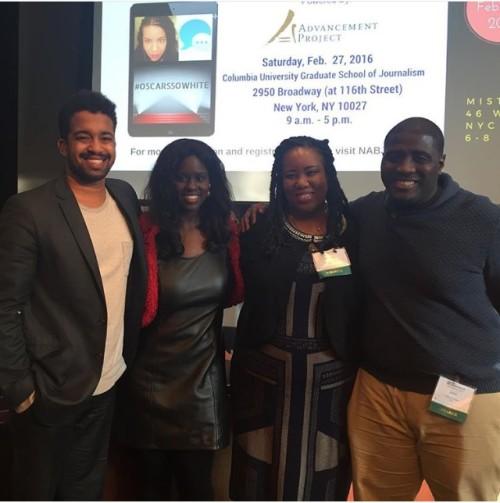
Panelists:
- Rembert Browne (@Rembert), Culture Writer, New York Magazine
- Charreah K. Jackson (@Charreah), Love & Relationships Editor, ESSENCE
- John Ketchum (@Ketchcast), Social Media Team, CNN
In this panel, Charreah Jackson and Rembert Browne shared branding tips and also why it’s important in the age of digital media for writers and journalists to have a brand.
John Ketchum of CNN spoke candidly about journalists of today having the advantage of self-publishing which means that the mainstream media doesn’t need to make your work relevant, the content will speak for itself. “You don’t need the mainstream media as a megaphone for your voice, you have the Internet,” he said.
All three of the panelists shared their thoughts on not over-sharing on social media platforms since it is your brand. Social profiles make up the package that represent you outside of you work, therefore being truthful and not inappropriate are tips the panelists shared as essential for writers and journalists.
“I personally struggle with it [branding]… I love to write. Journalism became the best way for me to write… There was a personal responsibility that comes with having a personal brand. I feel a responsibility to tell stories truthfully,” shared Rembert Browne, writer at the New Yorker.
Browne expanded on his journey with personal branding since there were moments where he realized writing was his display of activism. He also shared that it’s important for writers to not waste all their great and powerful thoughts on Twitter.
“Your personal brand is important. People take you as seriously as you take yourself…To have to package yourself for a story is different [but it essential],” said Charreah K. Jackson, Love & Relationships editor at ESSENCE. “My word is my integrity… when you’re out in this world they don’t just see you, [they see the entity you’re attached to,]” Jackson said.
Jackson also shared that capturing your content and starting to build your professional portfolio early will help when you’re starting off as a writer and journalist.
Sree’s Social Media Master Class
Sree Sreenivasan (@Sree), Chief Digital Officer, Metropolitan Museum of Art
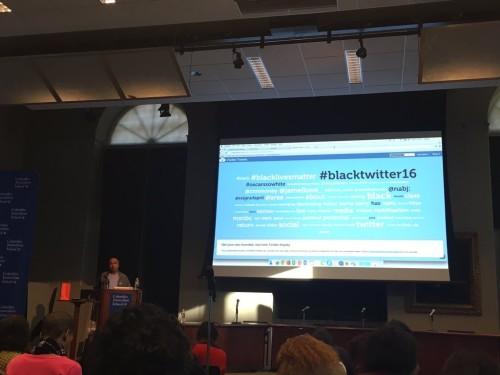
As the Chief Digital Officer of the Metropolitan Museum of Art (), Sree Sreenivasan is part of the team that engages thousands of visitors online daily. Sree’s Master Class included tips on how to clean up social media profiles and how to garner followers online.
Key tips:
- You have seconds to convince someone to follow you on Twitter.
- Canva, PicCollage and Fotor are great for Facebook.
- Desperation doesn’t work on LinkedIn.
- LinkedIn blog posts are great for seeing immediate impact.
Photo Credits: Bryan Monroe, Philip Lewis, Harlem Guide, National Association of Black Journalists, Charreah Jackson, Jozen Cummings, Kimberly Drew.





